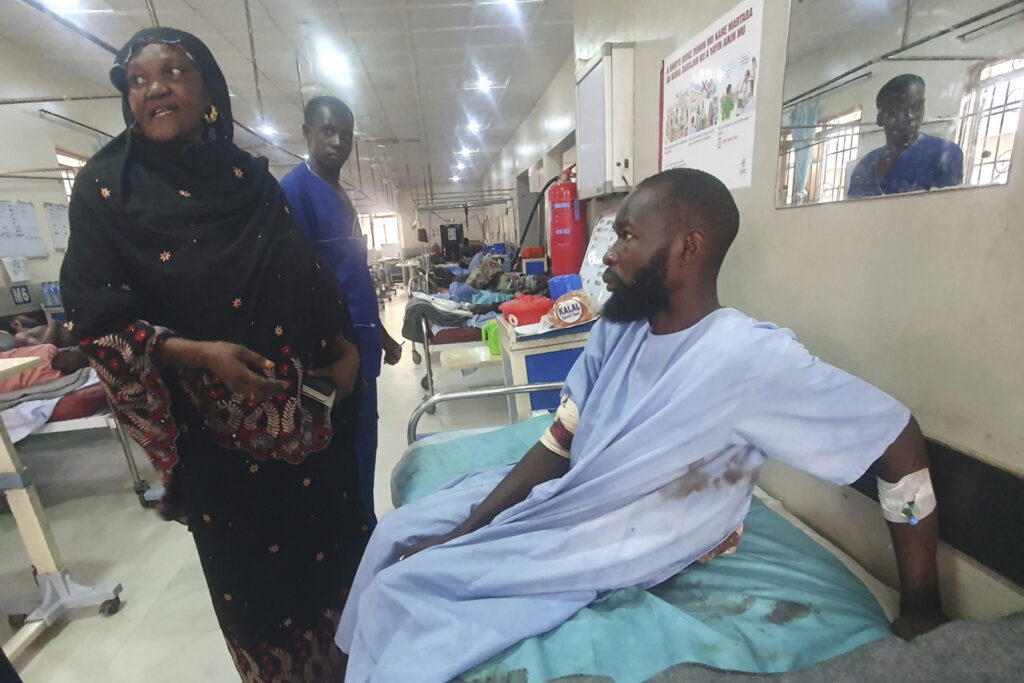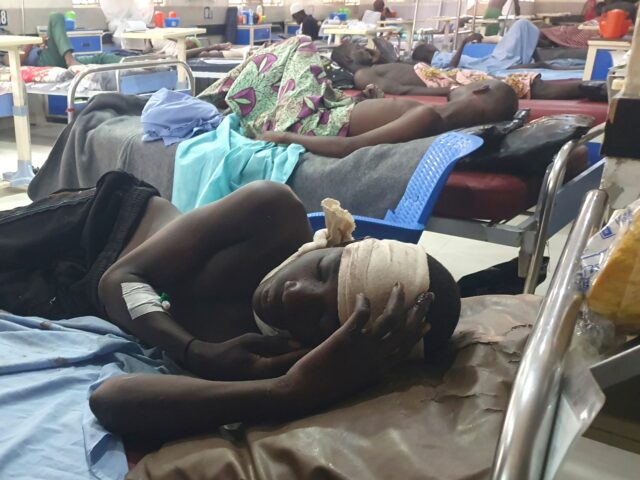Reports out of northern Nigeria on Sunday and Monday indicate the death toll in a string of suicide bombings in northeast Borno state has risen significantly, including as many as 30 people and threatening to grow as hospitals take in dozens of injured.
Authorities in the state, long plagued by Boko Haram-organized jihadist terrorism, initially reported 18 deaths on Sunday after suicide bombers detonated what are believed to have been improvised explosive devices (IEDs) in several populated sites in the town of Gwoza, located near the Sambisa Forest that Boko Haram has used as its headquarters for at least a decade. By later that night, the Nigerian newspaper Vanguard reported that 30 people had died and dozens of others were in danger as they suffered severe trauma and blood loss from the explosions. Local reports have identified some of the dead as children and pregnant women.
The local Islamic leader of Gwoza, Emir Alhaji Mohammed Shehu Timta, told Vanguard that terrorists targeted three crowded sites in the town as the attacks were happening.
“The first suicide attack was masterminded by an unidentified woman who sneaked with two children into a wedding reception of a popular young man in Gwoza. She detonated her Improvised Explosive Devices (IEDs) killing herself and many people,” Timta reportedly said. “A few minutes after, another suicide bomber sneaked into a burial ceremony nearby and detonated Improvised Explosive Devices, and as am talking to you now, the third explosion just occurred a few minutes ago with more casualties.”
Ultimately, authorities reported four suicide bombings. No terrorist organization has taken responsibility for the attacks but, given the location of the attacks near the Sambisa Forest and the use of apparently female suicide bombers and children, local media have reported that Boko Haram is widely seen as the likeliest culprit. Nigeria’s Premium Times newspaper reported on Sunday that the bombings occurred in “areas where the Boko Haram faction led by Ali Ngulde operates.”
Reports from Nigeria have not revealed any information related to the religious identity of the victims, nor do the suicide bombers appear to have left any messages discovered at press time explaining their choice of targets. Borno is a majority-Muslim state with a sizable Christian population. Jihadists often attack Christian targets such as schools and churches, but also have a record of attacking fellow Muslims, particularly Shiite Muslims or those considered insufficiently pious for a number of potential reasons.

An injured victim of a suicide bomb attack receives treatment at a hospital in Maiduguri, Nigeria, Sunday, June 30, 2024. At least 18 people were killed and 30 injured, including 19 seriously, in coordinated attacks by suspected female suicide bombers in Nigeria’s northeastern city of Gwoza on Saturday, local authorities said, raising security concerns in a region which has been at a center of Islamist insurgency. (AP Photo/Joshua Omiri)
The U.S. Commission on International Religious Freedom (USCIRF) listed potential Boko Haram targets in a profile of the group as including “churches, individual Christians, persons engaged in “unIslamic” activities, Muslim critics, northern elders, schools, police stations, government buildings, newspapers, and banks.”
The rapidly rising death rates in the suicide bombings on Sunday appear to be related to the severity of the injuries suffered by those still alive. In a report on Monday, the Daily Trust confirmed with medical personnel in the area that some of the casualties include “seriously injured” people who may not survive the damage.
Given the nature of the events targeted – particularly the wedding and funeral – many people lost multiple family members as a result of the attack. Some told the Daily Trust that practically all their immediate family members had died.
“This is just like a dream; I have lost five people in my family in less than 24 hours,” Buba Shehu, a local Gwoza resident, told the Daily Trust. “Three died yesterday (Saturday) … We also received a call this (Sunday) morning that two people passed away due to lack of blood in their bodies. So, personally, I lost three family members and two of my good friends. This is painful.”
Shehu said that many of those attending the local wedding were from the state capital, Maiduguri, where many of the seriously injured have been transferred for more advanced medical care.
Another man, Abdul Umaru, lamented to the Daily Trust that he had planned to go to the targeted wedding but failed to do so as a result of a “challenge of logistics.”
“I was furious with myself for missing the wedding ceremony in our family house,” Umaru said, “only for me to hear that there was suicide attack during reception. Two of my uncles lost their lives. Two of my elder brothers are currently undergoing a series of treatments due to wounds they suffered from the attacks.”
“We are broken and you can see hundreds of people in this place. It is sad, you see someone and next day, you hear that some useless people have killed him,” he lamented.
"Christians slaughtered in Nigeria — a Commonwealth country!" https://t.co/5Ijf6vpoVq
— Breitbart News (@BreitbartNews) March 18, 2019
Suicide bombings, especially those conducted by women and children, were once pervasive in Borno state. Boko Haram spent much of the early 2010s committing mass abductions of women and girls – the most notorious of which targeted over 200 schoolgirls at a Christian school in the town of Chibok in 2014 – and trapping them in the Sambisa Forest, where the terrorists used them as medics, cooks, and sex slaves. Many bore multiple children to the terrorists, later to be used as suicide bombers.
Boko Haram’s female and child suicide bombers were especially prolific in 2016 and 2017. In 2016, two girls believed to be about seven or eight years old self-detonated at a market in Maiduguri, killing one and injuring 17, not including themselves. Two female suicide bombers killed over 65 people that year in a separate attack on a camp housing people displaced by Boko Haram violence.
In January 2017, Nigerian authorities revealed that the two women found to have committed another string of suicide bombings in the state were carrying infants on their backs as they detonated.
Boko Haram has operated without interruption for over a decade in northeast Nigeria, though it has split into several factions. Former leader Abubakar Shekau, believed to have been killed in 2021 after several false reports of his death, pledged allegiance to the Islamic State in 2015, rebranding the group as the “Islamic State West African Province” (ISWAP). That decision resulted in the creation of multiple splinter groups, divided by whether the group should seek leadership from the largely Middle Eastern Islamic State or remain independent – a division the Nigerian government exploited to falsely claim that Boko Haram no longer existed.
The Premium Times reported on Sunday that a core of the Boko Haram group had “been suppressed by its breakaway faction, Islamic State West African Province (ISWAP), following the death of its leader, Abubakar Shekau.”
President Bola Tinubu, who has faced intense criticism for taking little action against growing jihadist activity nationwide, issued a statement on Sunday condemning the bombings this weekend.
Presumed jihadists stormed a Catholic church in southwest Nigeria Sunday and opened fire on worshipers, killing at least 50 and wounding dozens more. https://t.co/9l5xDQz757
— Breitbart News (@BreitbartNews) June 6, 2022
“President Tinubu describes the attacks as desperate acts of terror and a clear manifestation of the pressure mounted against terrorists and the success achieved in degrading their capacity to launch offensives,” presidential spokesman Chief Ajuri Ngelale relayed in a statement. “The President declares that the purveyors of wanton violence shall have a certain encounter with justice.”
“That these cowardly attacks are only but isolated episodes as his government will not allow the nation to slither into an era of fear, tears, sorrow, and blood,” the statement concluded. “The President states that his administration is taking necessary measures to secure citizens, emphasizing that efforts will be redoubled to ensure that those who trouble the nation, dispatching precious lives, and disrupting law and order are completely removed.”
It is unclear at press time what action the Tinubu government will take to directly respond to the bombings in Gwoza outside of providing emergency medical care to the victims.

COMMENTS
Please let us know if you're having issues with commenting.